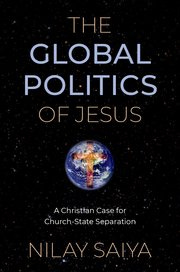Nilay Saiya
The Global Politics of Jesus: A Christian Case for Church-State Separation
Oxford: OUP, 2022.
Nilay Saiya is an Indian-American scholar, raised in Pennsylvania, and is now Assistant Professor of Public Policy and Global Affairs at Nanyang Technological University in Singapore. Saiya comes to this book with the experience of an immigrant in the American Bible Belt as well as the perspective of an international scholar with an interest in the role of religion in global affairs. His book offers a neo-Hauerwasian critique of both Christian Nationalism, which he calls “Christianism,” as well as political isolationism, which he calls “Detachment.” He believes the ethics of Jesus call his followers to renounce worldly politics, not getting comfortable or cosey with governing authorities, while bearing faithful witness to the gospel as part of their “prophetic witness.”[1]
Saiya’s central thesis is that when the church tries to capture state power that the church itself is inevitably captured by state power, which produces tremendous harm to the mission of the church and even leads to disastrous outcomes in global politics.[2] His view is one that is a variation of the “two kingdoms” model where Christians have exclusive allegiance to the kingdom of Christ and their activity in the common kingdom flows from that allegiance, but at the same time limits their political involvement because of their exclusive allegiance to Christ.[3]
Saiya argues with verve and erudition against Christians embedding themselves within the state and, further, that Christianity thrives when compartmentalized away from the corrupting echelons of political power.
First, Saiya highlights the threats and seductions of Christian Nationalism. The book opens with an anecdote about Saiya. On the day when he arrived in Singapore his cabdriver was a Christian who was enthusiastic for Trump because he was a Christian. Indeed, Saiya learned that the cabdriver was merely one of many Singaporean evangelicals who were enthusiastic for Christian Nationalism, those hoping to transform Singapore into a truly “Christian nation.”[4] On defining his terms, he says “Christian Nationalism refers to the belief that Christian countries represent central actors in the purposes of God and should reflect Christianity in their national identities, political cultures, and national symbols. It is a pervasive cultural framework that compasses the country’s traditions, myths, and self-perceptions, and blends Christian and patriotic narratives in a way that obscures the line separating religious from political identity.”[5]
His apt definition gives way to an apt critique: “Christian nationalism creates, sustains, defends, and sacralizes social boundaries, often manifesting in bigotry and xenophobia against those believed to be outsiders to the accepted conception of the nation.”[6] Christian Nationalists are reduced to the status of “a courtier with the state.”[7] In addition, Saiya offers an excellent survey of Christian Nationalists governments in Africa and South America that committed manifold abuses of power and engaged in horrendous violence. It proves his point that Christian Nationalism leads to violence, terrorism, bad foreign policy, attacks on human rights, and damages the soul of the church.[8] His verdict is fitting, “When Christians begin to see politics as their raison d’être, they devise arguments contrary to the most foundational principles of the kingdom of the cross, including the obligation to love one’s enemies and to refrain from violence.”[9] To which he adds, perhaps with an air of overstatement, that “the biggest threat to Christian vitality is not persecution, affluence, education, or pluralism. It is instead political privilege.”[10]
Second, Saiya argues that Christians should be wary of trying to outwardly Christianize a nation, which I mean the best examples are advocating for certain symbolic pieces of legislation (e.g., abortion) and decrying the removal of religious monuments (e.g, a monument of the ten commandments outside a courthouse). It is one thing for Christians to be the conscience of a nation, but it can result in what I would call the Talibanization of Christian witness whereby Christians become known for what they are against, as a kind of morality police with zeal to impose Christian views on non-Christians. Saiya points out that banning abortion does not equate to ending abortion and can even result in increasing the number of abortions.[11] He writes that, “Christians risk compromising their witness when they attempt to advance Christian principles primarily through the institutions of the state.”[12] I concur as the myth of the chosen nation lends itself to becoming the narrative justification for violence against “others.”
Third, Saiya rightly warns too of the dangers when the churches are coopted by the state, entangled with the state, or simply become a department of the state. The church should not consider its purpose to provide religious capital to the state, nor pursue the patronage of the state to support its mission. The reason is that state support for religion can easily morph into state control of religion.[13] He adds too that Christianity generally thrives in a political atmosphere of religious toleration for all religions, whereas Christianity is generally declining in countries with state-sponsored support for the church.[14]
That said, I do have several points of contention against Saiya, as I do not find his refined Anabaptist views compelling at every point. You’ll have to wait for the nice blog post to see my points of critique.
[1] Saiya, Global Politics of Jesus, p. 7.
[2] Saiya, Global Politics of Jesus, p. 4.
[3] Saiya, Global Politics of Jesus, p. 8.
[4] Saiya, Global Politics of Jesus, pp. 2-3.
[5] Saiya, Global Politics of Jesus, p. 52.
[6] Saiya, Global Politics of Jesus, p. 52.
[7] Saiya, Global Politics of Jesus, p. 72.
[8] Saiya, Global Politics of Jesus, pp. 76-82, 84-162.
[9] Saiya, Global Politics of Jesus, p. 124.
[10] Saiya, Global Politics of Jesus, p. 213.
[11] Saiya, Global Politics of Jesus, p. 42.
[12] Saiya, Global Politics of Jesus, p. 41.
[13] Saiya, Global Politics of Jesus, p. 50.
[14] Saiya, Global Politics of Jesus, pp. 214-36.





